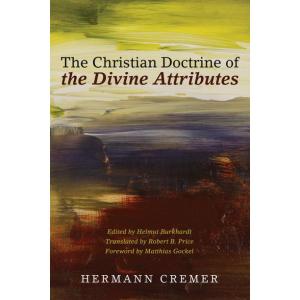The Christian Doctrine of the Divine Attributes Part 1
Here I begin a discussion, with others, of the book The Christian Doctrine of the Divine Attributes by German theologian Hermann Cremer. I announced this book discussion two weeks ago. If you have read Chapter I “The Concept of the Divine Attributes,” you are welcome to comment. If not, you are welcome to ask a question.
I read not only Chapter I but also the Introduction and Preface. I found the key idea of Chapter I in the Introduction on page xvii: “Academic theology assumes that the concept of God in Greek philosophical theology, that of Pure Being or The Absolute, is applicable to the God of the Bible.” Cremer argues that is a major error on the part of academic theology that has practical, negative consequences. For example, it makes it impossible to preach God in any way that helps hearers.
Chapter I, and I assume the whole book, is an attack on academic Christian theology’s treatment of God because it does not take seriously enough God’s historical self-revelation as God himself. “One obviously cannot preach about a God who has no attributes.” (1) What does Cremer mean by “no attributes?” I suspect most readers aren’t familiar with the kind of highly abstract theology Cremer criticizes here. But he says you can find it in the church fathers and in scholastic theology and it continues in the ivory towers of philosophical-theological speculation.
The theology Cremer critiques is now often labeled “ontotheology,” theology that treats God as being itself and not as the God of the Bible. That theology has often denied that God has any attributes. For it, the attributes of God are ways in which we experience God. They are mental. That because, for ontotheology, God MUST BE simple substance. To speak of God’s attributes as really in and of God is to divide God into parts. Therefore, God, the being greater than which none can be conceived, cannot have attributes.
Cremer criticized “the ultimate incompatibility between the practical interest of faith in the revelation of God in Christ and the academic formulation of the doctrine of God. … Today we have no excuse to continue in these old ruts.” (5)
Cremer sounds like Karl Barth! And there’s a reason for that. Barth was inspired and informed by Cremer. Most Barth scholars are barely aware of it, of how closely Barth followed Cremer in his idea of revelation as historical and of God as who he is in his self-revelation in history. (This book was written in 1897.)
Barth defined God as “The One who loves in freedom.” Cremer identifies God as “the one who is entirely love.” (8) “He is the one who in love wholly opens himself to fellowship with us. He wants this. This is God’s essence, the innermost being that fills him.” (8) How do we know this? Because “God reveals himself as love.” (9) “The attributes of God are the determination of his appearance in his action through his essence as love. They are the determination of his appearance in his action in such a way that in his action the original and eternal reality of the Good is one with the movement toward the realization of the Good. It is in this way that God is the highest good and the highest of goods.” (10)
This all sounds so much like Barth it’s shocking. I’m not suggesting that Barth plagiarized Cremer, only that it’s quite obvious to me that Barth was heavily inspired by Cremer. For Barth also, love is God’s essence and God is only truly known via his revelation, and God IS his revelation. Thus, God is historical, not a-historical (in spite of what seems to be the case at least according to Moltmann in CD I/1).
What about God’s attributes, then? They are real in God, in God’s self-revelation, in God. They are not parts of God or only ways in which we experience God. “They form a self-contained unity, which the religion of revelation has designated the glory of God. The attributes are, in their unity, the manifestation of the essence of God in its manifold activity—a manifestation that brings its object [should he have said “its subject?!”] with it.” (9)
Thus, according to Cremer, it is appropriate to say that God is omnipotent, not only as a way of expressing our feeling about God or as a way of designating a part of God. According to him, Christian scholastic orthodoxy and even Schleiermacher were wrongly obsessed with a certain presupposed idea of what God must be, pure being, being itself, the being greater than which none can be conceived, the being different in every way from creatures, the infinite. That, according to Cremer and Barth (and also Brunner) is a disastrous starting point that ends with God having no attributes or his attributes being all One (hints of neo-Platonism!) which is the same as no attributes!
For those of you who struggle to understand Cremer, watch for the parts that will preach! Look at page 9 where he talks about love. “A life without others would be a life without purpose, without feeling or movement, a life good for nothing and no one, frozen in its indifference and inactivity, a dead life, a self-contradiction. To be completely for others is completely to live.” (9)
God’s essence and activity are one—love. God is for us. God is historical. God is not an object of speculation. God’s attributes reflect God himself.
Now let’s go on to Chapter 2: “The Derivation and Classification of the Attributes” in one week.
A question I will keep in mind is this: Does Cremer take his own point of view about God and God’s attributes far enough? Or does he stop short of what he should have said?
*If you choose to comment and/or question, make sure what you write is relatively brief (no more than 100 words), on topic, addressed to me, civil and respectful (not hostile or argumentative), and devoid of pictures or links. Only comment if you have read the chapter. Otherwise you may ask a question.*














